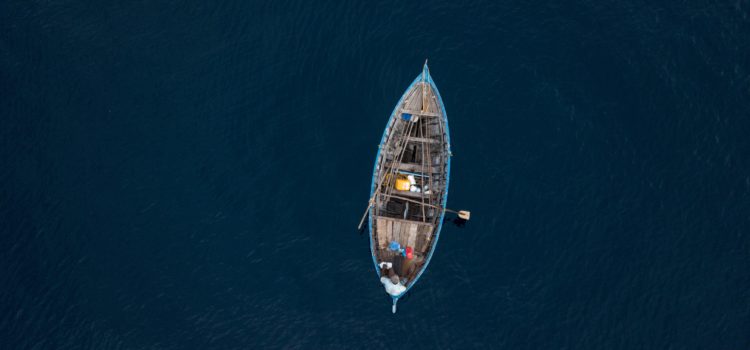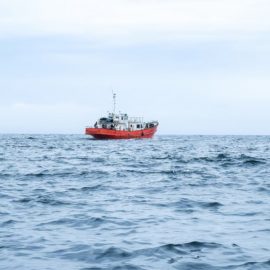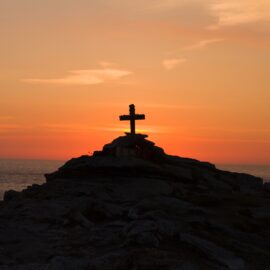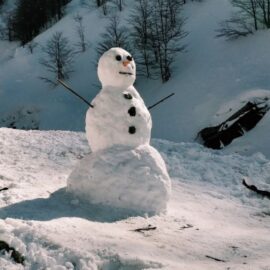

This article is an excerpt from the Shortform summary of "Unbroken" by Laura Hillenbrand. Shortform has the world's best summaries of books you should be reading.
Like this article? Sign up for a free trial here .
What does it mean to be lost at sea? Are there well-known accounts of people who were stranded and rescued?
Louis Zamperini was lost at sea for 47 days when his plane crashed during World War II. He survived along with his friend, Russell Allen “Phil” Phillips. At the time, they surpassed the record for survival while being lost at sea. Unfortunately, after being lost at sea both men were found by Japanese soldiers and became American POWs.
Lost at Sea After the Crash
The Green Hornet had crashed, and only Louis, Phil Phillips, and Mac McNamara had survived. Louis looked at their meager rations and knew their lives would be in jeopardy if they weren’t smart. They were near the equator, and dehydration would set in quickly. He devised a plan in which each man would get two squares of chocolate and three sips of water a day. This plan was meant to keep them alive for several days, at which time, they should be rescued from being lost at sea.
Mac was a zombie. He hadn’t said a word since getting into the raft, just completing Louis’s commands with a distant look in his eyes. With the provisions figured out, Louis had time to register pain throughout his body. What he didn’t know was that he’d broken all of his ribs on impact. He pushed the pain away, as he did thoughts of the other members of his crew.
Louis couldn’t help but think about the mysterious way he became free of the wires under the surface. But all thoughts were put on hold by the arrival of sharks. Louis saw several sharks, some as long as twelve feet, circling the rafts, testing their strength by dragging their fins along the bottom fabric. For now, the sharks seemed content to circle without striking.
As night settled, the temperature plummeted. The men were chilled to the bone, so they bailed water into the boats to be heated by their bodies. The only sound on the open water was that of teeth chattering. Phil was still unconscious, and Louis soon drifted to sleep. Only Mac was awake, stricken by fear.
Lost at Sea and Wasting Away
Five days lost at sea without food and little water was beginning to take its toll. No other planes had appeared, and Mac finally cracked. He wailed around like a trapped animal, screaming that they were all going to die. Louis slapped him and Mac stopped shouting, but he returned to his catatonic state. Louis prayed silently for the second time in his life.
The lost men’s proximity to the equator created dangerous conditions during the scorching afternoons. Their bodies burned in the hot sun, their lips ballooned, and their skin cracked. They couldn’t get relief in the water because of the circling sharks, and there was nothing to drink.
Three days after the last of their water was consumed, a storm appeared on the horizon. Soon, the sun was shielded by clouds and rain poured down, providing a little relief. Louis made a funnel with the air pump canvas and filtered water into their tins. Once the rain stopped, the canvas proved to work as a hat. They made two hats and took turns wearing them once the sun reemerged.
With the days at sea stretching on with no end in sight, Mac’s selfish consumption of the chocolate grew in significance. Louis found it hard to hide his resentment, but he could see that Mac was stricken with guilt, so he let it slide. However, over the next weeks, starvation settled in, and the men were unable to turn their minds from food.
They survived by catching birds, eating the raw flesh, and using the rest as bait to catch fish. They never caught more than one or two tiny fish, but the meager ration was enough to give them energy and lift Louis’s and Phil’s spirits. Mac’s spirits could not be lifted.
The time between birds and fish was often long, leaving the men toiling for days. Intermittent rainstorms helped replenish their water supplies, but they always ran out before they could collect more. Days and weeks passed with no sounds other than the small ripples in the ocean.
Louis and Phil knew it was not uncommon for men lost at sea to go insane, and they decided they had to do something to keep their minds strong. They quizzed each other and told intricate stories about their pasts. Sometimes Phil sang church hymns, and Louis returned the favor by singing Christmas Carols.
Sometimes, they’d describe meals they’d enjoyed, detailing the ingredients, preparations, and flavors. Something about the detailed descriptions brought the food to life, especially when Louis described his mother’s cooking, and the brain was somehow tricked into satiation.
Talks also turned to the future, and Phil and Louis shared their plans for what they would do once they got back home. Talking about life after rescue filled Louis and Phil with hope, but Mac still lingered in darkness. He rarely shared stories and only spoke a few times, usually to ask Louis to describe his mother’s dishes.
Louis’s unruly determination as the Terror of Torrance served him well on the raft. As he had in the face of bullies, he turned his insolence about their current circumstances into a resolution to remain undefeated.
Salvation?
Two good things came from the attack. The men were able to use the damaged raft as a sun shelter and blanket, and they had a better idea of where they were. Because the plane was Japanese, Phil reasoned they had drifted about halfway to the Marshall and Gilbert Islands. If they kept going at this pace, they’d likely see land after three more weeks.
Louis became resentful of the circling sharks. A few more had tried to attack them, and Louis decided to give them a taste of their own medicine. Louis caught two small sharks and split the livers in three. For the first time since the morning they took off in the Green Hornet, the men were full.
The nourishment worked for a while, but days later, Mac began to deteriorate dramatically. Louis and Phil did what they could to keep him alive, but one night, Mac asked if Louis thought he was going to die. Louis wanted to give Mac a chance to say any final words and said he thought it likely and soon. But Mac didn’t say anything else. Before the morning of Day 33 would come, Mac would release his last breath.
Although Mac had originally put the men in a perilous state, his help on the rafts had been immeasurable. Louis and Phil held an impromptu service over Mac’s body before sliding him into the water. The next day, without realizing it, Louis and Phil surpassed the record for survival while being lost at sea.
With only two of them, there was more room and more rations to go around when they had some. But even with the extra water and bits of food, Louis and Phil continued to suffer. They were skin and bones, covered in sores, and dying from starvation.
Then, one morning, everything changed. Upon waking, Louis and Phil felt the stillness of the raft, as though stationary on land, and looked around to see a world bathed in placid blue from top to bottom. They had drifted into the doldrums, the colloquial sailor term for the Intertropical Convergence Zone, a swath of ocean near the equator where winds from the north and south converge, creating an intense stillness.
The silence and reflection of the sky on the mirror-like surface of the water transcended reality and brought a sense of peace to both men. Louis felt they had been provided a mystical gift in the midst of what had seemed like certain death. It was an auspicious moment, and the two soaked in the essence of that timeless space until sunset.
Hope
Days passed without any sustenance for the men, and the raft was becoming as ravaged as their bodies. Phil began to see swarms of birds in the distance, but as the sounds crossed the open water, he realized they were planes. There was no doubt the planes belonged to the Japanese, but they were too far away to be of concern.
Then, on July 13, forty-six days into being lost at sea, a great storm swooped in and created massive waves. The waves lifted the raft high into the air, allowing the men to glimpse a landmass far off in the horizon. As the waves moved them forward, the men discussed strategies for how to navigate their arrival into enemy territory. They would row toward the islands and scope out an uninhabited area. They pulled out the oars and started their journey toward land.
Suddenly, the great storm turned into a typhoon. The waves grew to immense proportions and tossed the raft like a plastic bottle. Louis and Phil laid flat to maintain a center of gravity, and Louis tied the raft’s rope around their bodies to keep from losing it if they capsized. Both men were more scared than they had been when the Green Hornet went down.
In the pre-dawn hours, the storm ceased, and the water smoothed out. It was still dark, but Louis smelled something he hadn’t smelled in a long time—the earthy aroma of land. As the sun rose, the men saw that they’d been pushed up to the boundary of the island, which was now several small islands. They forced their shoes on and rowed toward the valley between two.
Before long, Louis saw a ship heading in their direction. The men tried to row out of sight, but it was too late. The boat pulled up next to the raft, and Louis and Phil found themselves caught in the crossfires of several guns held by Japanese soldiers
Being lost at sea was a terrifying ordeal for both Louis and Phil. By the time they were picked up by the Japanese military, each of them had lost half of their body weight. But being lost at sea wasn’t the end of Louis’s ordeal.

———End of Preview———
Like what you just read? Read the rest of the world's best summary of Laura Hillenbrand's "Unbroken" at Shortform .
Here's what you'll find in our full Unbroken summary :
- How Louie Zamperini was on track to become an Olympic athlete until the war started
- The unbelievable story of his capture as a prisoner of war
- The ultimate fate of Louie and his captors






